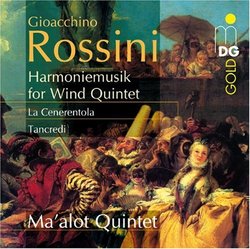| All Artists: Rossini, Ma'Alot Quintet Title: Harmoniemusik for Wind Quintet: La Cenerentola Members Wishing: 1 Total Copies: 0 Label: MD&G Records Release Date: 1/26/2010 Genre: Classical Styles: Historical Periods, Classical (c.1770-1830) Number of Discs: 1 SwapaCD Credits: 1 UPC: 760623158327 |
Search - Rossini, Ma'Alot Quintet :: Harmoniemusik for Wind Quintet: La Cenerentola
CD Details |
CD ReviewsAn unusual harmonie transcription from Rossini Larry VanDeSande | Mason, Michigan United States | 05/21/2010 (4 out of 5 stars) "I collect and enjoy harmoniemusik but don't know if there have been other transcriptions, in whole or part, of the two Rossinin operas here -- Tancredi and La Cenerentola. The history of recorded harmonie from Rossini's operas is not lengthy. Though Vienna's Wenzel Sedlak (1776-1851) transcribed Rossini's Barber of Seville to the harmonie format among the other scores he made from the likes of Beethoven, Weber, Hummel and Mozart, it has not had a prolific recording history.
The last one I encountered was by Mozzafiato and clarinetist Charles Neidich Harmoniemusik: Sextet from Le Nozze di Figaro and Il Barbiere di Siviglia; Rossini's Quintet ~ Vivarte Sony Classical while the more lasting impression was made by the Netherlands Wind Ensemble in their 1977 LP Rossini for Wind that included the Barber suite and Sedlak's transcriptions of overtures to Corradino, Semiramide and The Italian in Algiers. For this recording, clarinetist Ulf-Guido Schafer transcribed the opera scores into 15 parts, 9 for Tancredi and 6 for Cenerentola. The Ma'alot Qunitet recorded these in 2009 in Germany. They have also recorded the harmoniemusik score to Beethoven's Egmont, Prometheus and Ruins of Athens Beethoven: Harmoniemusik for Wind Quintet. Compared to octet groups like Opera Senza and harmonie scores like Triebensee's for Mozart's Don Giovanni Mozart: Don Giovanni (arr. Triebensee) [Hybrid SACD], anyone coming new to the Rossini may think the quintet format wanting and the music a bit brief. While that may be true, the committed performances here and MGD's natural sound make up for any shortcoming either real or perceived. The more important issue is this quintet's ability to add new music to the harmonie format, expanding the quantity of opera transcriptions available to lovers of the harmoniemusik format. I've heard a lot of dull and bad music converted to harmonie in 30 years and this is not among that group. While it lacks the electric charge of Beethoven and depth of a Mozart opera, the Rossini projects the same humor, songfulness and infectious rhythm we love in his operas, even in the serious music from Tancredi. Experienced harmoniemusik fans will want this for their collection. Anyone coming anew to the format may enjoy this and will want to collect some of the other recordings I've cited here as well as some of the redoubtable Julius Rudel's Mozart opera realizations Mozart Operas: Harmoniemusik Arrangements of the Period + Beethoven's Fidelio. For other recommendations see my listmania list Harmoniemusik worth hearing, searching out, and owning." |

